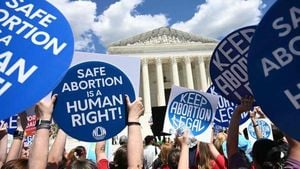High tension marked the recent soccer match between France and Israel held at the Stade de France, as it was overshadowed by significant security measures and protests stemming from the complex geopolitical climate. The French capital was the center of attention not just for the anticipated UEFA Nations League game but also for rising protests linked to the Israeli-Palestinian conflict.
On the eve of the match, protests erupted across Paris against the backdrop of a gala organized by far-right figures aimed at supporting Israel. This event stirred controversy, especially as it drew significant attention due to its connection with the Israeli government and its military actions. High-profile guests were present, including Israeli Finance Minister Bezalel Smotrich, which fueled tensions among demonstrators.
Demonstrators articulated their displeasure, denouncing the gala as supporting actions they equate with oppression and genocide. Protesters clashed with authorities as they attempted to make their voices heard, underscoring the fractious atmosphere permeated by sentiments surrounding Israel's military campaigns, which have inflicted devastating tolls, particularly during the recent outbreak of violence.
To manage crowd control and minimize violence, authorities deployed over 4,000 police officers, along with extensive security staff around the stadium. The event's setting became highly controversial across varying factions, from left-wing politics voicing dissent, to far-right supporters openly exhibiting their stance, complicity gripping the tensions present during the match.
During the game itself, the atmosphere was electric but fraught. Spectators witnessed the Israeli national anthem being met with loud booing from sections of the crowd—a clear signal of discontent. Palestinian flags made their way past security protocols, raising questions about the restrictive policies typically enforced at sporting events.
The match ended without major interruptions aside from the charged atmosphere, concluding with a 0-0 draw. Yet, the presence of violence loomed as police stated two arrests had been made due to skirmishes near the Israeli fan sections, highlighting the unusually charged energy filling the stadium.
Outside the confines of the stadium, pro-Palestine activists expressed vehement opposition to the match itself. Many argued against its continuation, claiming it normalized the Israeli presence during times of high civilian casualties due to military actions. Activists criticized French President Emmanuel Macron’s attendance at the match, perceiving it as tacit support for policies they contest vehemently.
Concurrently, outrage spread when scenes of vandalism were reported from protests, including damage to businesses seen as symbols of American consumerism. Clashes with police erupted, leading to dispersals enforced with tear gas, as the protests took on violent tones, illustrating the deep division present within the French populace.
These events echo broader sentiments across Europe, where rising anti-Israel sentiment has led to increased scrutiny and violence directed at Israeli tourists and athletes. This backdrop provides startling insight, showing how the football match became not just a game, but rather, it unfolded as part of the larger chorus of political discontent reverberated across Europe.
With tensions still palpable following the match, French authorities expressed their commitment to not relenting to what they termed as "mob rule" amid calls for football ties to be severed with Israel. Macron’s interior minister stated, “France does not give way to those who sow hatred,” emphasizing the commitment to maintaining the sport as a political battleground amid turbulent broader societal issues.
The layers of security and protest surrounding such events peel back to expose the conflict far beyond the pitch—laying bare the impactful intersection of politics, community sentiment, and sporting culture.
The aftermath of the match left behind not just memories of potential violence, but questions confronting French society, as the necessity for dialogue grows but is often stifled beneath the roar of conflicting nationalistic pride and ideological belief. While sports can often serve as bridges for cultural exchange, the France-Israel match starkly illustrated how they can also serve as flashpoints for deep-seated political animosities.
For many, the pitch echoed both with chants of football fandom and the cries for political change, angst surrounding the changing demographics of Europe weaving through the dynamic fabric of each protestor's attachments. The ambiance stirred suggests France stands at the crossroads of sports and issues yet to be resolved across its fields, reflecting broader existential inquiries concerning identity, ethics, and global interconnectedness.



